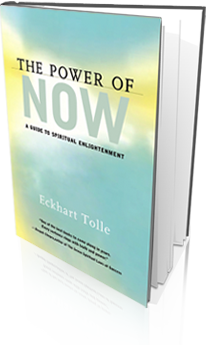When I was a kid, I remember asking my parents on our way home from mass on Christmas Eve, “When will it be tomorrow?” Eager for the gifts and festivities we’d been planning for weeks, I longed to be out of the now–to not have to wait any longer for what seemed like a reality that might not ever come. Of course, tomorrow, and Christmas, always came, with laughter and sweets and twinkle lights. But it wasn’t really tomorrow, was it? As I grew up a bit, I realized that my question was impossible to answer. What I thought of as “tomorrow” would always, eventually, be “today.”
The idea of living fully and undeniably in the present–the titular “Now”–is the message of Eckhart Tolle’s inspiring, best-selling book The Power of Now: A Guide to Spiritual Enlightenment. The title may bear all of the tell-tale signs of a hokey-pokey spiritual self-help guide, the kind I usually consider a waste of brain cells to read. But trust me, dumplings, this one is different.
Tolle is a no-nonsense kind of guy, and he doesn’t let the reader take any shortcuts or make excuses for not embracing the power of Now. The book’s format is a series of questions and answers, taken from real questions he received over the years after experiencing a major spiritual revelation himself at the age of 29. As such, his words feel directed very much at you, and he often raises the exact quibbles and obstacles that you’d had while reading. It’s also easy to dip in and out of, because of handy symbols placed throughout the text to indicate where you should pause and reflect on what Tolle is telling you. This makes reading the book an experience and journey unto itself, something that can happen as slowly or quickly as you need to–much like the journey to finding enlightenment.
In ten chapters, the book outlines the various ways that one can achieve a single goal: achieving a state of Being in the Now. What does that mean, exactly? First, you need to stop trying to understand what Being or Now or any of the other spiritual terms Tolle uses. Enlightenment is not something intellectual, and making it so is 100% counterintuitive to the process; as he says, “Understanding presence is being present.” But for the sake of its exegesis, one might say that Being is a state of surrender, stillness, and presentness wherever and however you are. There is no past or future–no tomorrow or yesterday–only now. To illustrate with a mindful eating example, you might think of how it’s best to eat what and how much you want at a given moment, rather than eating based on what you had yesterday (no guilt for that dessert or latte) or later (no “saving calories” for the brunch you’re having out tomorrow morning). It’s all about now–how you feel in this moment.
This might sound easy in concept–aren’t I always living in the now?–but it’s actually quite hard to do at all times and with your whole self. It’s almost like being in a constant state of meditation: acutely aware of one’s breath, the feeling of one’s body, but without acknowledging extraneous thoughts or external interruptions. In today’s world, we’re distracted by so many things inside and outside that it’s nearly impossible to find a moment of stillness. Meditation is hard, and can take years to be able to sit still with oneself for as little as 10 minutes.
So how is one meant to achieve this elusive state, one that Tolle claims will eventually save the world from its own self-destructing habits of stress, anxiety, and ignorance? The answer I’ve derived from reading is practice. Find pockets of the day when you can really be present and embrace them, and don’t feel bad about other times when your mind takes over and starts juggling 100 balls. On my 25-minute walk to work, I focus on my breath, observe the beautiful blooming park to my right, breathe in the air and feel the sun on my skin. It’s harder during the work day to focus my attention internally, but closing my eyes and taking 10 deep breaths every so often can make the busyness of any situation melt away. During yoga class, I am more conscious of feeling rooted and supported in each pose, rather than thinking about my muscles being tired, or the rising temperature in the room (once it hits summer, any vinyassa class seems like Bikram!), or what I will eat for dinner and what manuscript I’ll read when I get home.
These small things don’t make the problems foisted upon us go away, or change the way others behave. It only changes how we deal with them and our assessment of a situation in any present moment. Being aware and undistracted leads to better decisions and more thoughtful reactions 100% of the time, and it’s something that even the most high-strung people (and I used to be one of them!) can appreciate. Once you are at peace, you exude peace. And the world certainly needs more peace.
With these things in mind, I encourage you to pick up Tolle’s work and discover for yourself what it might feel like to really Be who you are meant to be.
Related: How to Find Stillness – Lesson from a Yoga Retreat
How to Find Time for Meditation in Your Busy Life
5 Things I Learned from Gwyneth Paltrow – and 2 Things I Didn’t
Get more like this–sign up for our newsletter for exclusive inspirational content!
Photos: Lulu Lovering via Flickr; www.huffingtonpost.com






